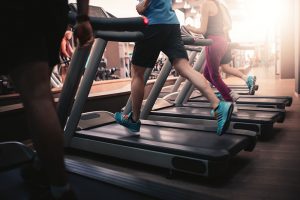Exercise has become an obsession in many developed countries, with many people turning to purposeful activity to compensate for our otherwise sedentary lifestyles. There are a variety of programs gaining popularity, from CrossFit to yoga and marathon running. However, many people do not get the results that they desire from their exercise regimens. New research suggests that this may be partially due to the timing of these activities. Due to certain factors involving our circadian rhythm and internal clocks, there appears to be a best time of day to exercise. However, your personal best time of day to exercise for weight loss and other positive health effects may depend on your goals and individual needs.
Different Types of Exercise
 Many people do not realize that they should not only be getting more exercise but getting more of diverse kinds of exercise. In general, there are four different types of exercise that health professionals recommend: strength training, aerobic exercise, flexibility exercises and balance training. All of these are important to maintaining a healthy and functional body over a lifetime. In fact, major health agencies recommend that people get each of these types of exercise on a regular basis.
Many people do not realize that they should not only be getting more exercise but getting more of diverse kinds of exercise. In general, there are four different types of exercise that health professionals recommend: strength training, aerobic exercise, flexibility exercises and balance training. All of these are important to maintaining a healthy and functional body over a lifetime. In fact, major health agencies recommend that people get each of these types of exercise on a regular basis.
Strength training, such as weightlifting, is crucial because it builds muscle that contributes to weight loss and a higher general metabolic rate. However, it is also crucial for building strong bones. This type of exercise is important for people of all ages, but especially for people approaching old age and those who are otherwise at risk of fractures. Aerobic exercise is important because it trains our bodies to have endurance, or to be able to perform for longer amounts of time. In addition, it gives our heart and lungs a workout, contributing to better long-term health and lower disease risk in these systems.
Balance and flexibility come naturally to us as children but gradually become problem areas. Because it is normal to lose both balance and flexibility as we age, doctors recommend doing focused balance exercises such as yoga or tai chi as well as daily stretches throughout adulthood.
Is there a better time of day to fit in these diverse activities? According to researchers, the answer is yes—but the best timing depends partially on your individual health goals. In addition, lifestyle factors and individual preferences are also important in deciding when to work out.
When is the Best Time of Day to Exercise?
Many experts have recommended for years that people exercise early in the morning. There are several clear benefits: Exercising in the morning prevents people from losing energy and motivation to make healthy choices as the day goes on, plus it leaves many people feeling more energetic and alert throughout their days. However, there appear to be benefits to exercising at other times of day as well.
Afternoon appears to be the best time for both strength training and flexibility exercise. Based on our circadian rhythm, our muscles perform best in the afternoon and are also more flexible. This allows people to get more gains, whether strength or flexibility is their goal. In addition, perceived exertion is lower, which means you can work harder without feeling as much exertion.
However, when it comes to exercise benefits, evenings appear to be the best choice. Despite popular myths that it will interfere with sleep, evening exercise appears to actually improve our overnight slumber quality. In addition, people are less likely to injure themselves in the evening, likely to an overall higher body temperature at this time.
Timing Your Exercise for Best Results

According to experts, timing can make a measurable difference in the effects of exercise. However, this does not mean that people should skip workouts if they cannot fit them into the ideal time of day. Doctors point out that getting plenty of activity is the most important goal, regardless of the time when it happens. In addition, these studies have found only general trends that are not true for all people. If you feel more flexible in the morning, this is likely the best time to perform stretches, yoga and other exercises intended to keep you limber.
Timing and the circadian rhythm appear to be important in almost every aspect of health and wellness. Working out at the right time of day may help you to see faster results and thus to feel more motivated over the long term. However, it remains most important to simply keep active throughout your day and to focus on getting each of the four kinds of exercise needed for optimal health over our lifetimes.







